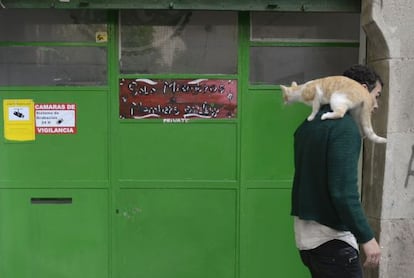The Barcelona cannabis clubs that are now plugging their wares online
The 400 marijuana associations in Catalonia are reporting a boom in drug tourism in the region

All it takes is internet access and a Google search for the keywords “marijuana Barcelona.” A list of options of where to buy the drug immediately comes up, and all in English too, because the clubs that advertise online are after what is already being termed “cannabis tourism.” It is a growing trend in the Catalan capital, where 200 or more cannabis clubs are to be found in the city center even as authorities scramble to find a way to regulate the practice.
The websites offer anyone the chance to join a club via email or telephone, and even provide lists with the different types of marijuana products available for sale and their prices. For instance, one gram of AK47 costs €9 while a gram of Silver Haze goes for €10.
After getting in touch with the seller, interested parties are given the club’s address and warned that membership fees are €20. Valid ID is also required, this newspaper has confirmed.
These clubs have found a way to sell cannabis: to set themselves up as associations. But some conditions must be met, such as being not for profit and handing out their products on a members-only basis.
Despite the fact the sector administers drugs and handles large amounts of money, there is little industry regulation
“This condition meets with legal requirements and aims to guarantee that there is no indiscriminate access [to the drug],” explains Martí Cànoves, a criminal lawyer.
Catalonia has around 400 cannabis clubs that are officially registered as associations, half of which are in the city of Barcelona. Many of them stick to the law, but others do not, as an online search demonstrates.
It is an extended practice, and from time to time the regional Catalan police, the Mossos d’Esquadra, step in. Three members of a Barcelona club were arrested on Wednesday morning after being found looking for customers on the street.
For years, the Federations of Self-Regulated Cannabis Associations of Catalonia (Fedcac) has been asking the regional government for some kind of regulation and insisting on the importance of distinguishing lawful clubs from the unlawful ones. This group has even drafted a code of good practices that all federation members must observe.
“Besides requiring endorsement from a member, we wait a week before approving a new application in order to prevent cannabis tourism,” explains Albert Tió, Fedcac spokesman.
The federation estimates there might be more than 165,000 club members altogether, of whom 60,000 are regular consumers who spend between €50 and €100 a month.
The department of internal affairs fears regulation could encourage drug use even further
In other words, these not-for-profits make around €5 million a month collectively.
The marijuana that the clubs sell their members is grown in concealed industrial warehouses where the electricity supply is often tampered with to avoid raising any red flags, since a lot of lighting is used to accelerate the plants’ natural growth rate.
Yet despite the fact that this is a sensitive sector that administers drugs and handles large amounts of money, there is little to no industry regulation. Last year, the regional health department drafted a preliminary proposal for legislation. Some of its suggestions were to set a minimum age for joining a club, placing a limit on the number of members and amount of drug that may be sold each month, and prohibiting promotional campaigns.
“Since then, there has been no progress,” laments Tió.
The department of internal affairs, however, sees risks in regulating cannabis clubs because it fears it could encourage further drug use.
Meanwhile, the city of Barcelona — which has no legal power to address this activity per se — is putting the finishing touches on an ordinance that club premises will have to observe, including a ban on clubs near schools.
“But nobody wants to regulate the bottom of this, which is access to cannabis,” says Martí Cànoves.
Tu suscripción se está usando en otro dispositivo
¿Quieres añadir otro usuario a tu suscripción?
Si continúas leyendo en este dispositivo, no se podrá leer en el otro.
FlechaTu suscripción se está usando en otro dispositivo y solo puedes acceder a EL PAÍS desde un dispositivo a la vez.
Si quieres compartir tu cuenta, cambia tu suscripción a la modalidad Premium, así podrás añadir otro usuario. Cada uno accederá con su propia cuenta de email, lo que os permitirá personalizar vuestra experiencia en EL PAÍS.
¿Tienes una suscripción de empresa? Accede aquí para contratar más cuentas.
En el caso de no saber quién está usando tu cuenta, te recomendamos cambiar tu contraseña aquí.
Si decides continuar compartiendo tu cuenta, este mensaje se mostrará en tu dispositivo y en el de la otra persona que está usando tu cuenta de forma indefinida, afectando a tu experiencia de lectura. Puedes consultar aquí los términos y condiciones de la suscripción digital.








































